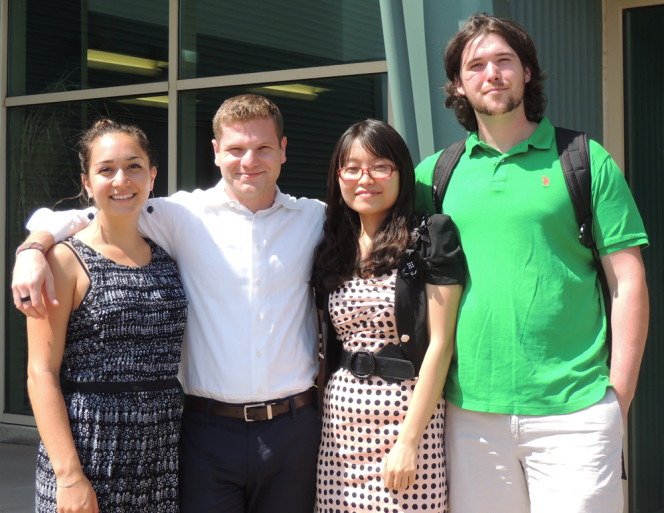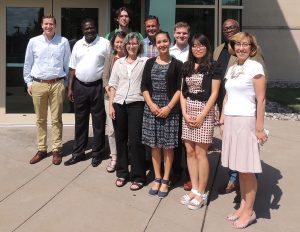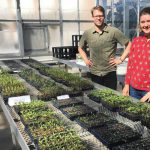2014 Recipients Of The Jerome Goldstein Scholarship Fund For EcoEntrepreneuring

2014 Recipients of the Jerome Goldstein Scholarship Fund For EcoEntrepreneuring (left to right): Selen Altiok, Alec Roth and Boni Zhang. Ian MacCloud also presented his research, funded by a different Rutgers program.
The 2014 recipients of the Jerome Goldstein Scholarship Fund For EcoEntrepreneuring presented their research findings at the Rutgers University EcoComplex in Bordentown, New Jersey on August 25, 2014.
Each student recipient served as an intern at the EcoComplex this summer.
Participating interns conducted their research with Rutgers EcoComplex staff, Rutgers faculty and/or incubator companies located at the EcoComplex. Each prepared a presentation for the August 25 event, as well as authored a research paper.

Present for the ceremony (left to right) : Gavin Daugherty (grandson of Jerome Goldstein), Professor Albert Ayeni (Rutgers University), Ian MacCloud (funded by a separate program), Rill Ann Goldstein Miller (Publisher, BioCycle), Nora Goldstein (Editor, BioCycle), David Specca (Assistant Director, Rutgers EcoComplex), Selen Altiok (scholarship recipient), Alec Roth (scholarship recipient), Boni Zhang (scholarship recipient), Kevin Lyon (Rutgers University) and Serpil Guran (Director, Rutgers EcoComplex).
The 2014 Jerome Goldstein scholarship recipients and their presentations titles
Selen Altiok:
“Food Waste-to-Energy-Potential-Solution for Disaster Resilience”
Alec Roth:
“Non-Recycled Plastics as a Feedstock for Advanced Fuels”
Boni Zhang:
“Economic and Environmental Comparison of Tomato Production Scenarios”
Jerome Goldstein (1931-2012) was the founding Editor and Publisher of BioCycle and founder of The JG Press, Inc.
The Jerome Goldstein Scholarship Fund For EcoEntrepreneuring supports student researchers at the Rutgers University EcoComplex in Bordentown, New Jersey. The EcoComplex integrates composting, anaerobic digestion, compost utilization, agricultural production, renewable energy and enterprise development.
Colleges And Universities Invited To Compete In GameDay Recycling Challenge
GameDay Recycling Challenge invites colleges and universities across the nation to compete to see which school will produce the least amount of waste in their stadiums and tailgate areas this college football season.
Participating schools identify one or more games to report the amount of material diverted through recycling, composting and via food donations versus the amount thrown away.
Winners for each athletic conference will be recognized, with five different categories per conference. National winners will be recognized in two categories: 1) total amount recycled, composted and donated; and 2) diversion rate – or the percentage of waste diverted from the landfill.
Registered competitors represent 15 athletic conferences, including the Big Ten, Big 12 and The Ivy League. Colleges and universities are invited to accept the Challenge by registering on GameDayChallenge.org by Sept. 30.
“There are many benefits for a school participating in the GameDay Recycling Challenge,” said Robyn Hathcock, College and University Recycling Coalition (CURC) board chair, and housing zero waste program coordinator of the University of Oregon. “Not only does it bring positive exposure for school athletic programs, it expands the fan experience through game-day recycling and zero waste reduction activities. Because the 2014 time frame has been extended, schools can include late-season rivalry games, which will increase exposure, enthusiasm and performance in the Challenge.”
To gain an edge in the Challenge and green their games throughout the season, schools staff stadium recycling bins with student volunteers inviting fans to do their part, donate excess food to local organizations, and encourage vendors to use recyclable and compostable service ware.
“Leveraging the school spirit that comes out during these classic football rivalries presents a unique opportunity to build awareness and connection to waste reduction and recycling among college football fans of all ages,” said Brenda Pulley, senior vice president, recycling, Keep America Beautiful.
“As more and more college football stadiums step up their sustainability game, the GameDay Recycling Challenge showcases the top zero waste college stadiums in the country while offering technical assistance and support to stadium-based recycling programs that want to achieve more,” said Stacy Wheeler, RecycleMania, Inc. president. “The response to the Challenge so far has been remarkably positive and growing.”
This year, GameDay Recycling Challenge will also honor schools that are committed to Zero Waste via an online “Zero Waste Wall of Fame”. Zero waste is commonly defined as reaching a 90 percent or higher diversion rate.
Last season, 88 schools competed in the GameDay Recycling Challenge, which is managed by CURC, the Environmental Protection Agency’s Wastewise Program, Keep America Beautiful, and RecycleMania, Inc.
Challenge participants diverted 1.5 million pounds of material from the waste stream in 2013, preventing greenhouse gas emissions equivalent to removing 413 cars from the road for a year.
For more information about the GameDay Recycling Challenge, visit GameDayChallenge.org.
New ASTM Standards For Sustainability Of Manufacturing Practices
In July, ASTM International, one of the world’s largest development and delivery systems of standards and related products and services, announced ASTM WK35702, Guide for Evaluation of Environmental Aspects of Sustainability of Manufacturing Processes. The new standard assesses environmental impacts at the manufacturing process level, and is designed to increase resource efficiency. “WK35702 will help identify opportunities in operations planning, provide guidelines for collecting data and give insight into how to calculate metrics on which informed decisions can be made,” states ASTM member Paul Witherell with the National Institute of Standards and Technology. According to Witherell, the primary users of WK35702, pending its approval, will be small and medium-sized enterprises (SMEs) that want to incorporate sustainable initiatives into their production line. “While other documents may discuss sustainability in generalities, there is currently no standard to provide SMEs with technical and measurement guidelines on implementing sustainable manufacturing practices into their process decisions,” he adds.
Rhode Island Establishes Organics Ban
In July, Rhode Island Governor Lincoln Chafee signed an organics ban into law that will require generators of 104 tons or more of organics per year to divert that material from the landfill if they are located within 15 miles of a certified processing facility. The ban is set to take effect in January 2016. Rhode Island is the fourth state in New England to adopt an organics ban, following in the path of Connecticut, Vermont and Massachusetts.
FDA Controls On Animal Feed
Ever since the U.S. Food and Drug Administration (FDA) proposed its “Hazard Analysis and Risk-Based Controls for Food for Animals” rule change last fall, industry has flooded the agency and Congress with demands for its revision. As it stands, say industry stakeholders, the new rule — part of the 2011 Food Safety and Modernization Act — would send tons more food by-products to landfills rather than to animal feed. The comment period ended on March 31, with over 2,000 predominantly critical comments from groups such as the Grocery Manufacturers Association (GMA), the National Renderers Association, and brewers and distillers that have diverted spent grain to animal feed for decades. The FDA had already issued a HARPC (hazard analysis and risk-based preventive control) for human food in January 2013, and the new animal feed rule seemed to indicate that anyone making animal feed with food by-products would have to create another set of food safety plans and documentation. The extra cost burden, said comments from the GMA, for instance, would result in as little as 22 percent of food by-products going to animal feed, compared to nearly 70 percent today.
The FDA says the animal feed revision should be issued this summer, but won’t specify a date. In the meantime, however, a blogpost in FDA Voice by FDA Deputy Commissioner for Foods and Veterinary Medicine Michael R. Taylor clearly attempted to allay fears. “We’ve heard from trade groups and members of Congress, as well as individual breweries, raising concerns that the FDA might disrupt or even eliminate this practice by making brewers, distillers, and food manufacturers comply not only with human food safety requirements but also additional, redundant animal feed standards that would impose costs without adding value for food or feed safety,” Taylor wrote. “That, of course, would not make common sense, and we’re not going to do it. In fact, we agree with those in industry and the sustainability community that the recycling of human food by-products to animal feed contributes substantially to the efficiency and sustainability of our food system…we have no intention to discourage or disrupt it.”










